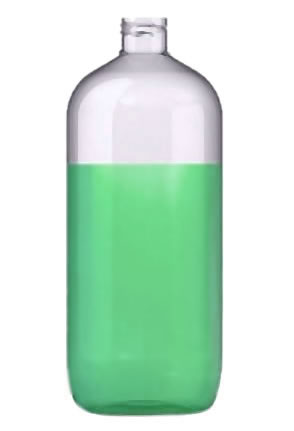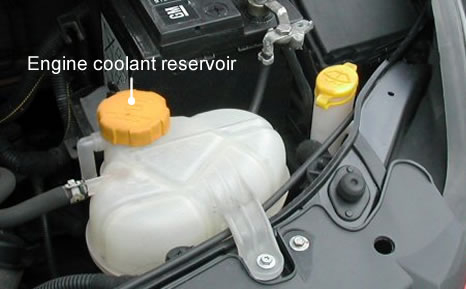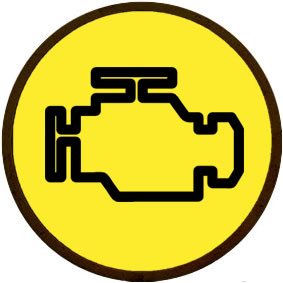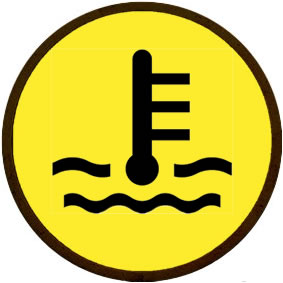This guide explains ‘What is engine coolant / antifreeze, what it does, why you should use it, what type of antifreeze / coolant to use and where to put it’.
Car engines create a great deal of energy by burning petrol or diesel. Some of this energy is used to move the vehicle forward (around one third), the other two thirds of the energy produced is converted to heat. Around half of this heat goes out of the exhaust, whilst the remaining heat remains inside the engine block.
Car engines need a way of cooling down else they will continue to increase in temperature until the working metal components inside will begin to literally melt, fuse together and the engine will seize. Engine coolant is a water based liquid that absorbs the heat from the engine.
The engine coolant becomes hot itself and so is transferred to a radiator located at the front of the car. Veins in the radiator contain the hot coolant which air cools as the vehicle moves forward.
Airflow through the veins is maintained by a fan if the vehicle becomes hot due to being stationary for long periods.
A significant number of engine failures are attributed in some way to engine cooling problems. To ensure the engine is kept at an optimal running temperature, engine coolant is used. Commonly seen as a green colour as the bottle to the right suggests, engine coolant is a mixture of water and antifreeze. Engine coolant or antifreeze does in fact come in a variety of colours from green, yellow, pink, red, or orange. The colour of the engine coolant does not necessarily indicate a specific type.

Antifreeze is a combination of distilled water and a type of alcohol. Ethylene glycol, or a more recent, less hazardous additive, but far more expensive propylene glycol can also be used. Antifreeze has many benefits to the engine cooling system.
What does antifreeze do?
The chemicals in antifreeze have huge benefits, and not only in winter. As the name suggests, antifreeze prevents the coolant inside your engine from freezing under normal winter conditions. In case you’re asking ‘what temperature does antifreeze freeze, water freezes at 0° C, or 32° F. A mixture of 50% water and 50% antifreeze will freeze at around -37° C or -35° F.
Antifreeze also raises the boiling point, water boils at around 100° C, or 212° F, increasing this temperature will benefit a hot engine as boiling water can damage an engine. A 50/50 mixture of antifreeze and water will begin to boil between 240° C and 270° C (464° F and 518° F), although the exact boiling point depends on the pressure of the mixture in the engine.
An obvious question might be, can you use 100% antifreeze? water is in fact the catalyst that makes antifreeze work. 100% antifreeze actually has a much higher freezing point at around -20° C or -5° F, compared to a 50/50 mix with water.
What else does antifreeze do?
Another benefit is that a good quality antifreeze, or engine coolant that has been regularly changed prevents rust corrosion. A reputable antifreeze that has been changed based on the retailers recommended guide and has the correct mixture should provide year-round protection to:
- prevent engine coolant from freezing in winter
- prevent engine water from boiling in summer
- prevent rust and corrosion of metal parts
- prevent corrosion against rubber and plastic parts
- become a good conductor of heat
- aid in preventing electrolysis
Antifreeze electrolysis
Over time, engine coolant breaks down and becomes slightly acidic. This can in turn make the coolant becomes electrically charged. Not by much, but a current of 0.20 volts or more can begin to corrode the internal metal components of the engine. Aluminium is particularly susceptible to corrosion from electrolysis.
Often by the time antifreeze or engine coolant electrolysis has occurred it’s too late as by this time the engine is leaking. Changing engine coolant based on the retailers recommendations will prevent this type of electrolysis.
Difference between engine coolant and antifreeze
Coolant is the liquid that circulates around the engine and antifreeze is usually a concentrate of glycol that requires dilution before becoming the coolant. Antifreeze can however be purchased already as a diluted mixture of 50% antifreeze and 50% distilled water.
Different types of antifreeze / engine coolant
There are essentially four main types of antifreeze:
- Green antifreeze– For a good many years, there was only one type of antifreeze that you could get, the standard green. As technology moved on however, various types of other products entered the market.
- OAT antifreeze – Organic Acid Technology (OAT) is an extended life antifreeze that lasts for around 5 years in the vehicle compared to the original green that lasts for around 2, to 3 years.
- Hybrid antifreeze – Basically a combination, or the best parts of traditional antifreeze and OAT antifreeze. Also referred to as HOAT, the product is beneficial as it offers good coolant to coolant compatibility. OAT antifreeze is not compatible with conventional antifreeze, making hybrid or HOAT and excellent top-up formula regardless of the type of coolant already in the engine.
Which type of antifreeze should I use
Antifreeze manufacturers use different coloured dye to distinguish the various types of antifreeze products available. Unfortunately and rather oddly, these colours are not standardised and therefore one manufacturer can use a different colour dye to another manufacturer, even if the product is the same.
This doesn’t make things particularly easy for the consumer and as a result, when choosing an antifreeze, the colour should generally not be used as a reference to the product you intend on purchasing. The added dye is beneficial however in leak detection. To correctly identify which type of antifreeze is suitable for your car:
- Your car owner’s manual should contain this information.
- If you do not have an owner’s manual, a car dealership who deals specifically in the make of your vehicle should be able to offer advice.
- Car accessory stores can offer advice on the correct antifreeze for your vehicle.
How to check engine coolant
It’s important to check your engine coolant levels regularly, if possible weekly. The coolant system is a sealed unit that constantly circulates the coolant to maintain a safe temperature for the engine. Therefore, coolant levels should not change too much and if they do, it may suggest you have a leak. Low levels of engine coolant may cause a dashboard warning light to illuminate.
Frequent engine coolant checks may enable you to discover and deal with a leak at minimal cost compared to overheating and breaking down whilst on the road. An overheating engine can potentially gain substantial damage, even to the point it becomes economically irreparable.
Engine coolant reservoir
The coolant system contains a coolant expansion reservoir as pictured to the right. When temperatures increase and pressures rise in the engine, this tank allows the coolant to expand and to even be released from the engine if necessary.
The coolant reservoir allows you to check coolant levels by visually comparing the coolant level to the minimum and maximum markers on the tank. To replenish coolant levels, the cap simply needs to be unscrewed and securely fastened once levels are maintained.

Coolant can get very hot and high engine pressures can cause coolant to gush from the tank to potentially scold. The sudden release of pressure may also damage the engine. To avoid this, ensure the cap is only removed when the engine is cold. Also, when the engine is hot, coolant expands and will not give you an accurate reading.
There may be other tanks that look similar to the coolant reservoir. It’s important you correctly identify the coolant tank as adding coolant / antifreeze to other reservoirs such as the brake fluid may have dangerous consequences. Consult your vehicle owner’s manual for advice if you are unsure, or consult a car dealer or repair service garage.
How much water to add to antifreeze
A 50% mixture of water and 50% antifreeze is often the required amount. Some antifreeze containers that are purchased are a pre-mixed coolant already at 50/50. Check to ensure it is not already pre-mixed. Don’t be tempted to put a higher percentage of antifreeze, or even 100% antifreeze in your engine as this is likely to have a detrimental effect and cause damage to your engine.
Where is the engine coolant
Under the bonnet of your car, you will see reservoir tanks. It’s important to know which tank contains the engine coolant. If you struggle to locate the reservoir tank, ask a family member or friend if they can help. A car servicing / repair garage will be more than happy to help.


To give you a good idea what you’re looking for, the engine coolant tank is often located towards the front-end of the car and will usually have a coloured cap. Colours vary. The cap may simply have ‘ENGINE COOLANT’ imprinted on it, or it may have a symbol such as those shown below in the images.
Where to buy antifreeze / engine coolant
You can purchase antifreeze or pre-mixed engine coolant from the internet, or any car accessory outlet store. A good branded antifreeze may cost a little more than a unbranded version, although due to the important role of antifreeze, it may be worth purchasing a good quality brand.

What I’d you have replaced the coolant with just water? Is that safe or advisable?
Hello Ademola,
If there’s a possibility of your engine overheating and normal tap water is all you have, then yes use it.
If it’s not, then it’s advisable to use proper engine coolant. Engine coolant has de-ionised water which means it has minerals such as calcium removed which will clog the system over time. Antifreeze also highers the boiling temperature which is another benefit.
If the level is above full is this dangerous to the engine?
Reservoir tanks have an overflow pipe which allows excess fluid to drain out onto the floor, so it shouldn’t be a problem.
Please I need help???
Always massage coming up to the dashboard,engine overheating,then I stop the car call AA they use thire computer to my Vauxhall zifara 63 plate,the car back work,where’s the problem
Raed,
You have a leak in your cooling system – it’s made partially by air and by water. It’s the water leak you need to get sorted.
I have an Astra sxi 2002.all the normal lights come on and go off as they should. Also the radiator light comes on and goes off when started.is this also normal?
Hi James,
As long as the light goes out shortly after the engine has started then this is normal.
I have a mini cooper s 2007 model turbo engine coolant light is coming on but the levels are all good I check them regularly
It would help you get to a place where you could get antifreeze but any more than that is not recommended. Water has a freezing point of 32 degrees and as it expands it can cause serious damage to your engine. The boiling point is also 212 degrees and can equally cause damage to your cooling system if it boils over. Do your best to maintain a mix of 50% water and 50% antifreeze (Ethylene Glycol).
Good day. My Mercedes c200 2004 model had the coolant bottle replaced. When driving with air conditioner on at times there is an Amber radiator like display warning. What could this be?
Hi
today morning my car computer Benz E280 2006 give me error coolant visit work shop
is this related to the coolant fluid level ?
Hi Ali,
If coolant levels are good, then it may be a faulty sensor and will need to be checked.
Please can you tell me what engine coolant I need for my 2014 Suzuki Alto?
Thank you!
Hello Brian,
Either green (long life) or blue (super long life) will be fine, but if you’re topping up, avoid mixing and use the same coolant which is already in there.
please which engine coolant can i use for my opel vectra b 2001 in Nigeria. The temperature meter rises above 90. please advise
Hi Dele,
Have a search for ‘Vauxhall approved antifreeze’ and it should offer you some options to choose form. It’s best not to mix and if your coolant is getting old, it may not be doing its job too well. You’re probably best off to drain the old coolant and replace with new.
Iv got a 2012 Ford fiesta my fan keeps coming on even on short journeys
Hi Mandy,
Have you checked your engine coolant level to see if it is running low? If the level if fine, there may be other issues such as a failing water pump for example. If the engine appears to be running hotter than it should, it would be a good idea to have it checked out else it can result in breakdown and engine damage.
Bello,
Please what type of engine coolant can I use for Hyudia 2007 because my engine coolant thank is empty can this avert my engine thanks
Hello, if you take a quick internet search, you can find coolant specific to Hyundai and universal for all of their vehicles.
Hi I have a 2013 Ford Fiesta I had my coolant topped up about 2 months ago to the minimum mark by a garage then today I checked it was 3/4 low , no lights ect ever come on how is this
Hi Sarah,
A garage would top the coolant up to the maximum mark. The minimum mark is at a level where there’s just enough coolant for your Fiesta to safely operate.
Are you sure the coolant level is not just above the minimum level due to there being no lights on?
Anyway, the coolant is contained in a sealed system and shouldn’t really require topping up very often. Levels will fall and rise as the temperature of the coolant increases and falls, so keep checking it when it’s cold. Also check under the engine for any wet patches (albeit small) as this could be a sign of a leak. There’s lots of places a small leak could develop such as the radiator, water pump, around the header tank, hoses etc.
Omg my Audi coolant level looks fine , however my dash light came in indicating coolant level ! I’m so confused 😌
Hello Kelly,
If you’re sure it’s the coolant level warning light, it’s likely just the sensor if the levels check out okay. Best get it checked out because if it’s a coolant temperature issue, you may have a failing water pump or something that may cause serious damage.
I got a code 011517 my car takes 2 or3 times to start is the a zafira 1.8 2008 any ideas thanks I got the code off pedal test
My 2011 corsa overheated in February gasket repaired. Its July the light has started coming on red intermittently. The garage say it just needs light switching off but now car smells hot (no temp gauge) and limping. It’s cold now, can I drive it 15 miles to the garage?
Hi Sax,
If you can get someone to tow it to the garage, that would be the ideal option. If the car is overheating and in limp mode yet there appears to be the correct level of coolant in the header tank, I would not attempt to drive it. Perhaps a water pump failure. If the engine coolant is low, then top it up and take extra water with you in case you need it. In that instance it sounds like a leak, so as long as you keep water in the system, you should be fine for 15 miles – but it does depend on how bad the leak is.
Hi I’ve got a vauxhall vectra club 2.2 estate. Running fine but recently the amber coolant light has come on. I’ve topped the coolant tank up appropriately but after a couple of weeks its back on and the level has dropped again. Could this be a small leak somewhere? If so where’s it best to start looking Please?
Hello John,
Yes, it’s almost certainly a leak. The best thing to do is to park up on a level and clean surface and make a visual inspection of coolant on the ground and see if you can trace it back. The water may evaporate when the engine’s hot. You may notice the leak when the engine’s hot an under pressure, but be careful not to burn yourself.
Easiest place to start is with the radiator, might have a small hole in it. Check hoses connected to the radiator as they can age and crack. Hose will lead to the water pump, the water pump being another source of a leak. Other hoses go to the heater core, but his is part of the system that pushes warm air into the cabin, so can be difficult to get to. If you notice any water inside the front of the cabin, this might be the problem.
Head gasket is another one. Pretty serious that one as it can result in engine damage. If you can’t see any obvious external leaks, I would get it sorted quickly as it’s not likely to get any better.
Hi, I have 2006 Kia Rio that’s been going without coolant at all and it’s giving a hard start on top of the fact that it mixes oil in the radiator. I’ve replaced a few sensors upon getting it diagnosed including the position sensor as well as the fan switch but the problem still persists (The hard start). How can I go about resolving this issue please?
My Mercedes C180 keeps showing the read radiator low sign intermittently I have tried ti see if the coolant is leaking but it appears to be OK and there are no signs of overheating though I have not travelled long distances with the car I leave in a hot part of Nigeria
Hi Kelechi,
If the coolant level is topped up to the correct levels but the low coolant light still comes on, it’s likely the coolant level sensor that’s at fault.
The coolant sensor on my vauxhall vectra is faulty and the warning light is permanently on my dashboard. I do I replace this?